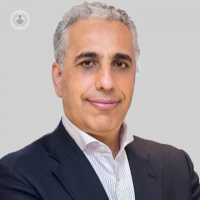Unveiling the link between the gut microbiome and breast cancer risk
Written by:In this informative article, Professor Kefah Mokbel, a highly respected consultant oncoplastic breast surgeon and professor of breast cancer surgery, explores the fascinating connection between the gut microbiome and breast cancer risk. Recent research has shed light on the profound influence our gut bacteria have on various aspects of our health, including cancer. Understanding this relationship can empower individuals to make informed decisions about their lifestyle and potentially reduce their breast cancer risk.

What is the gut microbiome?
The term gut microbiome refers to the diverse community of microorganisms, which includes bacteria, fungi, viruses, and other microbes, which reside in our gastrointestinal tract. These microorganisms play a vital role in maintaining our overall health by aiding digestion, regulating metabolism, strengthening the immune system, and more.
Breast cancer: A global health concern
Worldwide, breast cancer is the most commonly diagnosed cancer in women. Although several risk factors, such as genetics and hormonal factors, contribute to its development, emerging research suggests that the gut microbiome may also play a role in breast cancer risk.
What is the gut microbiome-breast cancer connection?
Inflammation and immune response
A healthy gut microbiome helps maintain a balanced immune system and reduces inflammation throughout the body. Chronic inflammation can promote the development of cancer, including breast cancer. Certain gut bacteria can modulate inflammation and potentially influence breast cancer risk.
Oestrogen metabolism
Oestrogen is a hormone that plays a crucial role in breast cancer development. The gut microbiome can metabolise oestrogen, altering its bioavailability and affecting oestrogen levels in the body. Imbalances in oestrogen metabolism may contribute to an increased breast cancer risk.
Gut barrier function
The gut barrier acts as a protective layer, preventing harmful substances from entering the bloodstream. An imbalanced gut microbiome can compromise the integrity of the gut barrier, allowing toxins and other harmful compounds to enter circulation. This disruption may contribute to systemic inflammation and potentially impact breast cancer risk.
Immune system training
The gut microbiome plays a vital role in training and shaping our immune system. A diverse and healthy gut microbiome can enhance immune surveillance against cancer cells, potentially reducing the risk of breast cancer and other types of cancer.
How to Support a Healthy Gut Microbiome
- Eat a balanced diet: Consume a variety of fruits, vegetables, whole grains, and legumes to provide essential nutrients for both your body and gut bacteria. High-fibre foods promote a diverse gut microbiome.
- Probiotics and fermented foods: Incorporate probiotic-rich foods like yogurt, kefir, sauerkraut, and kimchi into your diet. Probiotics can introduce beneficial bacteria into your gut.
- Minimise antibiotic use: Overuse or unnecessary use of antibiotics can disrupt the gut microbiome. You should only take antibiotics when prescribed by a healthcare professional.
- Manage stress: Chronic stress can affect the gut microbiome. Incorporate stress-management techniques like exercise, meditation, and hobbies into your daily routine.
While more research is needed to fully understand the intricate relationship between the gut microbiome and breast cancer risk, evidence suggests that a healthy gut microbiome plays a role in reducing the risk of breast cancer. By prioritising a balanced diet, promoting gut health, and maintaining a healthy lifestyle, we can support our gut microbiome and potentially lower the risk of breast cancer. Consult with healthcare professionals for personalised advice and guidance in managing your health.
Remember, knowledge is power, and by spreading awareness about the gut microbiome's impact on breast cancer, we can take proactive steps towards a healthier future.
If you would like to schedule a consultation with Professor Mokbel, you can do so by visiting his Top Doctors profile.


